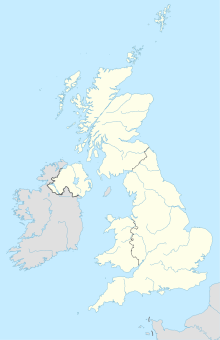Yeovil
Coordinates: 50 ° 56 ′ N , 2 ° 38 ′ W
Yeovil [ ˈjoʊvɪl ] ( ) is an English town in the south of Somerset at the confluence of the rivers "Yeo" and "Perett" with 45,000 inhabitants (as of 2015). It is the administrative seat of the South Somerset district .
Origin of the name and history
Yeovil was first mentioned in the Latin spelling Givele 1086 in the Domesday Book , an English land register from the 11th century. The name Yeovil is derived from Anglo-Saxon and describes a noble river , composed of the words ea and aerel .
From the Neolithic Age only two finds, a leaf-shaped arrowhead and part of a polished stone ax , have been found on an old road known as Harroway or Hoarway . In 1826, at a quarry near the first train station in Yeovil, the skeletons of a person and a horse were discovered, which were in two burial chambers and had gifts. Excavations uncovered another chamber with numerous human bones. A battle is believed to have taken place in the area.
In 1926 a Bronze Age grave with grave goods was discovered during road construction and in 1909 a gold neck ring from that time was found in a garden. A treasure with coins from Roman times came to light in 1916 when a water pipe was laid, which prompted further, this time scientific excavations, which uncovered the foundations of a Roman settlement with numerous preserved ceramics and iron household items.
At the time of the Saxons in the 11th century, Yeovil belonged to the Hundred of Stone , a historical administrative unit (roughly equivalent to the Harde ) of the counties in southern England. Representatives from 100 families regularly gathered around a large rock and publicly negotiated community legislative issues and held court. The Hundred Stone still exists today, the last meeting of the Hundreds took place there in 1843. References to a church in Yeovil can be found in the last will of a rich woman from 950 who gave the pastor a gift worth half a pound to pray for a deceased person.
Yeovil consisted of just one settlement around the Kingston mansion in the 11th century . Later a mill was built and further courtyards were built by dividing the property. In Norman times the place continued to grow. By 1140 there were 22 properties and Yeovil became a free parish . In 1205 the place received market rights and was allowed to hold trade fairs.
In 1348 the plague caused a decline in the population in Yeovil. Dissatisfaction with the peasants' wages led to unrest against the church in the person of the bishop; In 1415 the 13th Earl of Arundel sold the patronage of St. John's Church to Henry V , who in 1420 passed it on to Syon Abbey in Isleworth. The time ended when Henry VIII dissolved the monastery in 1539. Then worldly rulers followed. In the English Civil War Yeovil suffered greatly, many houses were destroyed and burned and residents attempted the financial contribution for the English army in Ireland to reduce.
In 1707 the pastor Martin Strong founded a school for the poor in Yeovil, which lasted until 1888, and in 1714 he founded a public lending library. Yeovil began to expand in the 18th century: in 1801 the city had 2,774 inhabitants, trade expanded and the market gained importance. The manufacture of gloves, tannery and a major staple industry fueled growth. In 1834 the first trade union was formed in the city.
In the 19th century, Yeovil was a center of the glove industry and had a rapidly growing population. In the 20th century, the city was the location of important companies in the arms industry and was therefore the target of bombing raids by the German air force from 1940 to 1942 .
economy
The city's main employer is the aircraft manufacturer AgustaWestland .
traffic
The Yeovil Junction railway station is the larger, Yeovil Pen Mill the smaller of the two remaining stations.
Sports
The football club Yeovil Town rose in 2013 to the Football League Championship , the second highest English division.
Town twinning
Yeovil is twinned with:
-
 Taunusstein ( Hessen ), since 1987
Taunusstein ( Hessen ), since 1987
Personalities
- Richard Edwards (1524–1566), composer
- Paddy Ashdown (1941-2018), politician
- John Mealing (born 1942), musician
- Hugh Banton (* 1949), musician and organ builder
- Sarah Parish (* 1968), actress
- PJ Harvey (* 1969), singer and songwriter
- Alan Norris (* 1972), darts player
- Jamie Davies (* 1974), racing car driver
- Tamzin Malleson (* 1974), film actress
- Heather Stanning (* 1985), rower and Olympic champion
Trivia
Since 2012, the non-commercial German radio play label "Neuvertonung" has been publishing a detective radio play series called Yeovil True . The stories of the radio plays are set in Yeovil and take up existing streets and places there. The title melody of the series is the piece Yeovil Town by the British folk music duo " Show of Hands " .
Web links
- Official website (English)
- Non-commercial radio play project Yeovil True (German)
Individual evidence
- ↑ Internet site about the Neolithic in today's Yeovil
- ↑ Internet site with information on Roman history in Yeovil
- ^ Website about the time of the Saxons in Yeovil
- ↑ Website about the time of the Normans in Yeovil
- ↑ Internet site about Yeovil at the time of the emerging Commonwealth
- ^ Website about the economic and political development in the city


